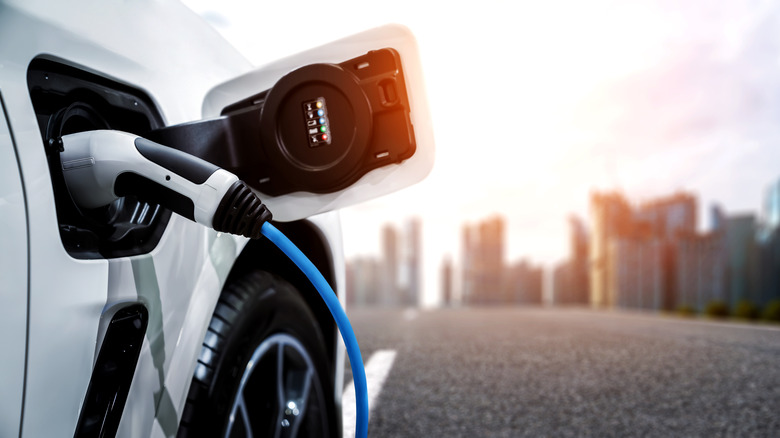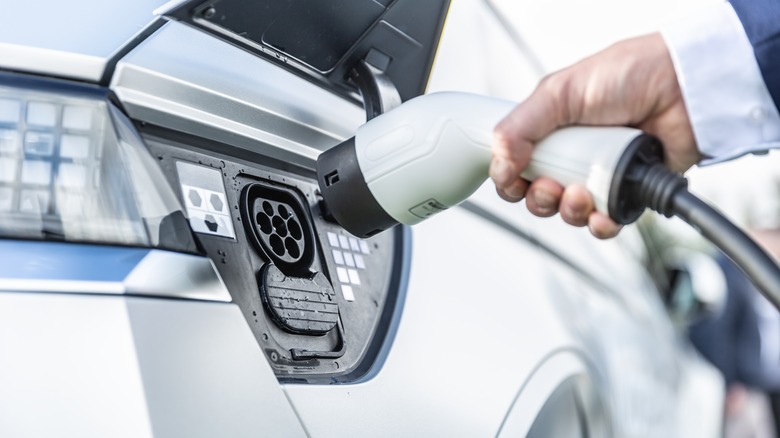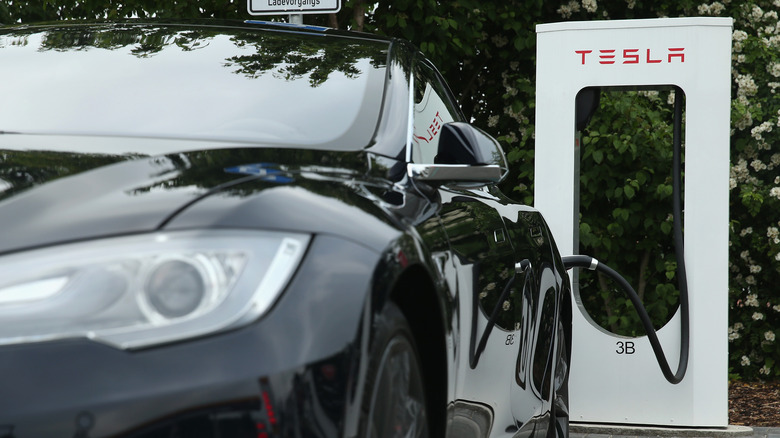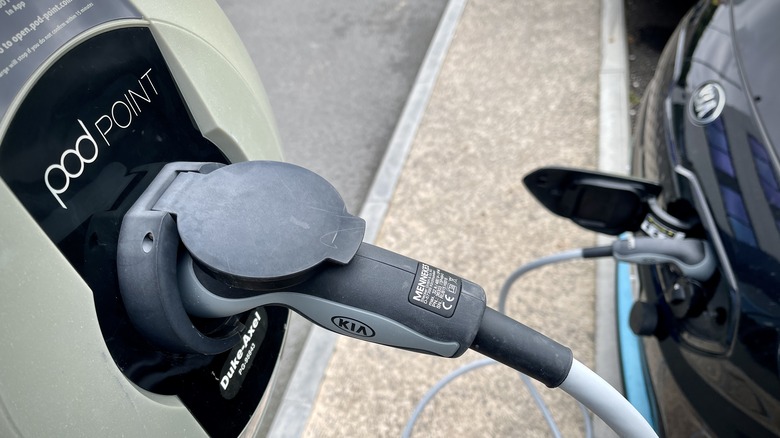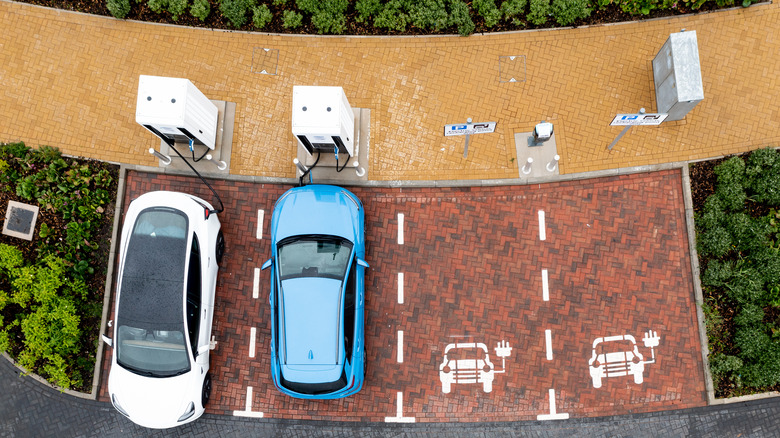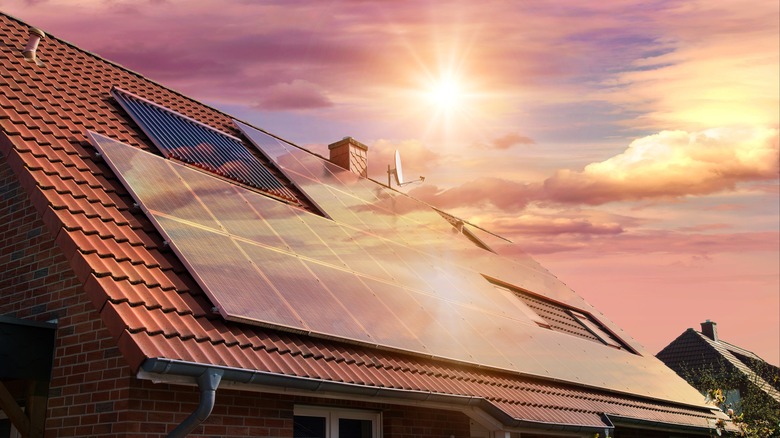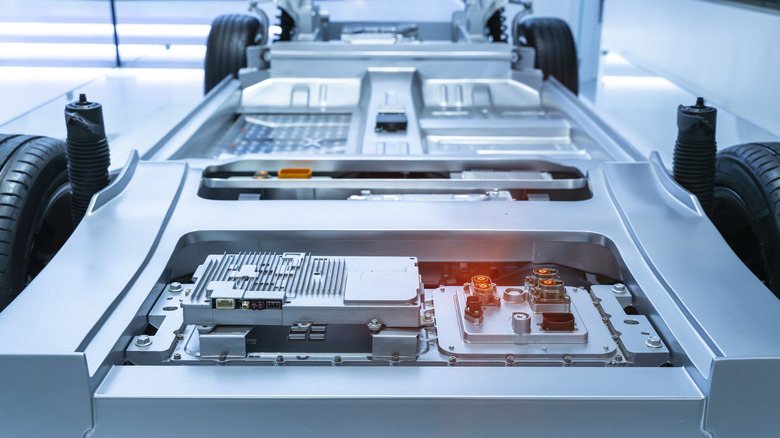10 Big Questions You Need To Ask When Buying A New Electric Car
Faith in the future of electric vehicles is finally growing in the United States. Last year, more Americans purchased an EV than ever before; according to The International Council on Clean Transportation, American electric vehicle sales increased by 103% from 2020 to 2021. The manufacturers that haven't put an EV on the market now stick out more than those that have. Even the fate of beloved, longtime muscle cars is electric.
Choosing to switch to an electric vehicle — or even a gas-electric hybrid — is a big decision that can seem complicated. In the beginning, there are so many uncertainties surrounding charging, maintenance, and longevity. Thorough research is a must. What should you know before buying an electric vehicle? Is an EV right for you? And if so, which one? Let's not put the cart before the horse, but we do have a few suggestions for the best electric vehicles in 2022 when you're ready to make that decision. There are some important questions to ask yourself before plugging in to the world of electric cars.
Would the EV be your only method of transportation?
The 2022 Lucid Air has a maximum range of just over 500 miles. According to Kelly Blue Book, this is the absolute best an EV can currently perform. And while 516 miles certainly covers the daily — and maybe even weekly — commuting demands of the majority with room to spare, if you are trepidatious about the switch to an EV and whether it's reliable enough to support your transport needs, don't feel bad. In January of 2022, Consumer Reports stated that the reliability of electric vehicles "has significant room for improvement," although the majority of EV owners with a 2019 model or newer are highly satisfied, per Consumer Reports' 2021 Auto Reliability and Satisfaction survey.
So you're not loving the thought of being 100% reliant on an electric vehicle yet. In this case, it's important to take stock of what options you'd have if you are suddenly unable to use your EV. Is there another vehicle in your household? Is public transport an option? Is your city pedestrian or cyclist friendly? Financially, is it feasible to finance another car or keep the one you currently have in addition to the EV?
If a kaput electric vehicle would leave you stranded with no other transportation options, that is worth weighing into your purchasing deliberations. It may also be of benefit to keep in mind that, according to Consumer Reports, the most reliable EVs are compact and plug-in hybrids — and the least reliable are electric SUVs.
Are you familiar with EV-related ordinances and incentives?
It pays to buy an electric vehicle — or, at least it does come tax time. The Federal Electric Vehicle Tax Credit grants up to $7,500 in tax relief for Americans who have purchased a brand-new, fully-electric vehicle during the applicable tax year. You'll want to stake your claim in this tax credit sooner rather than later, though, because it begins to disappear after a manufacturer surpasses 200,000 EVs sold (Tesla and GM are, unfortunately, already phased out).
There could be even more first-time electric vehicle buyer resources available on state and local levels — ranging from taxes and rebates, to parking incentives, financial assistance, and financing options for home charging installation. The U.S. Department of Energy's Alternative Fuels Data Center can help locate these additional resources.
An awareness of your city's electric vehicle ordinances and zoning standards — or lack thereof — is also one of those good things to know before buying your first electric vehicle. Local EV ordinances will give you an idea of where charging stations are permitted in your area, the minimum electrical capacity required for charging stations, and charging station requirements for multi-family properties like apartment complexes. Some ordinances state that new complexes must be equipped with one EV charging port per unit; others require that a minimum of 10% of the property's parking have an EV hookup. These standards will vary by state and municipality (via Great Plains Institute).
Are you equipped to charge at home?
Preparing for EV charging at home can be daunting. With such big batteries to gas up, you may think that some fancy rewiring is necessary. But what do you need to charge an EV at home, really? You'll need power run to your garage, of course, but according to the U.S. Department of Transportation, EVs can actually be charged residentially with a standard 120-volt AC outlet. This is called Level 1 charging and takes the longest. A fully-electric vehicle, the DOT says, will need 40-50 hours to get a full battery on a Level 1 charger — which is the charger that comes with the vehicle when you purchase it. Plug-in hybrids will only need 5-6 hours.
Level 2 chargers can be installed for residential use, but they require 240 volts in an outlet. A Level 2 charger needs 4-10 hours to boost a fully-electric car's battery to full, and just one or two hours for a plug-in hybrid. Most homes do have a couple of 240-volt outlets, but they're for high-consumption appliances like ovens, water heaters, dryers, or central AC units (via D&F Liquidators). Sources debate on whether 240-volt outlets can be installed at home, but hiring an expert for installation can prevent risk of electrocution or fire.
If you don't have 40 hours to spare for your EV to charge and can't get a 240-volt outlet, a plug-in hybrid may be your best bet. Plug-in hybrids, or PHEVs, require less charging time because of their smaller batteries. You should also be prepared for a $30-$60 higher electric bill per EV, Investopedia says.
What's your local charging network like?
There's not a single U.S. state without a public electric vehicle charging station, according to the World Economic Forum, but there are still plenty of regions where the closest EV station is likely to not be in your city, or even hundreds of miles away. It's a good idea to scope out the nearby public charging situation, especially if your home isn't equipped with a Level 2 charger.
Can you walk to the closest station and what's its typical vacancy? Are there any municipal regulations of that station you should know of? And one more important question: Are those chargers kept in good, working order? As the popularity of EVs increases, occasional reports have also surfaced exposing the shortcomings in EV charger maintenance — namely defunct software and broken charging wands, Charge Enterprises founder and CEO Andrew Fox told Autoweek.
In San Francisco, for example, less than three-quarters of the city's public chargers work properly (via The University of California). This is not an anomaly; a report from The Truth About Cars outlines how an EV driver staying at a "swanky" Downtown Seattle hotel discovered that, of the property's six EV charging stalls, only two were in working order. The problem doesn't lie with EVs, but with the lag between logistical EV support and EV demand. It's expected to persist as small/local/rural electricians adapt to the newfound maintenance need, so take stock of your charging options and plan accordingly.
Do you already have solar panels installed?
This is probably an unexpected important question to ask before getting an electric vehicle, but several experts implore that you hear them out. Both EVs and residential solar panels are better for the environment, but it may be more beneficial for you to go solar before going electric. As Boston Solar explains, the clearest benefit of investing your free capital in solar panels first is that your eventual EV can be charged with the renewable electricity generated by the panels.
This brings a double-dosed benefit: The energy charging the EV is clean and renewable, making it easier on the environment. And, the energy charging the EV is off-grid and free, making it easier on your wallet. It also means that, in the event of a grid outage, you'll still have access to a working vehicle. Having solar panels first will save you the increased energy bills when you start plugging in car batteries. Granted, the average EV costs less than $100 per month to charge, and a solar panel installation will run $15,000 to $25,000 on average (via Forbes), but the longevity of solar panels (at least 25 years, says the Sierra Club) and the other household energy consumption that it will negate makes it a worthwhile investment in the long run.
Are you prepared to pay more for insurance?
Insurance is a nonnegotiable expense of car ownership, and as anyone familiar with car ownership can begrudgingly attest, insurance premiums can vary wildly by driver age and history, as well as vehicle type. And according to Progressive, if you buy an EV, higher interest rates should be budgeted into the cost. This can be blamed on more expensive parts and overall higher repair costs, the insurance company says.
There's also the scarcity of electric-vehicle-proficient mechanics and repair technicians compared to gas-powered vehicles. The specialty training and high demand for qualified shops can drive up the price of repairing and insuring an EV. Unfortunately, the ways to reduce an electric vehicle's insurance premium have little to do with the EV itself and are mostly unchangeable circumstances: your age, driving record, and geographical location. Progressive assures longtime EV drivers that the rates are projected to come down in the long-term, though, as parts and qualified repairmen become more available and EV ownership continues to become more mainstream.
Do you live in a climate with cold winters?
Cold, snowy weather sure puts our cars through the paces in the winter. Road salt can cause corrosion and rust, winter driving conditions can reduce fuel economy, and, for gas- and electricity-powered cars alike, subzero temperatures can be hard on a vehicle's battery. As AAA explains, when temps drop, an EV's range will drop along with it. The average range loss varies by the source, but AAA states the average electric car could lose up to 41% of its range at outdoor temperatures of 20 degrees Fahrenheit.
We ask more of our EV batteries in the winter, and that's the leading cause of range loss. Most people are running their cabin heat when it's 20 degrees outside, which asks a lot of the battery. Other parts of the car will need heat, too, and without the combustion of a gas engine to generate some heat, even more strain is put on the battery. Defogging, seat heaters, less daylight so more use of headlights — all siphon charge from the battery. Adding on the fact that winter temperatures make the chemical reactions in a battery more difficult to achieve, and reaching a full charge will take longer, too.
Other aspects of winter driving — handling in the snow, traction — are the same or even better than gas-powered cars. If you live in a place where the temperature is under freezing for at least four months out of the year, managing the cold is something to consider.
What does it take to maintain an EV?
You don't have to change the oil on an EV. There's no gas pump to sputter out on you. No coolant leaks, no busted spark plugs. On a good year, this means infinitely less hassle and less money spent for an electric car owner. So what maintenance does an EV require? Even vehicles with no gas-powered systems have some components that, were they to break down, would be stressful and expensive. However, barring no chance of defective or faulty parts, there are few regular maintenance demands of an EV — and you're familiar with them all if you've ever driven a gas vehicle.
It's important to note that plug-in hybrids are going to have their own unique maintenance schedules that cater to gasoline- and electricity-powered systems. However, in the case of fully-electric vehicles, there are three major maintenance components, per Charged Future: tire rotation, passenger compartment air filter replacement, and a purge of vehicle coolants. Conventional gas combustion vehicles, on the other hand, have eight major maintenance categories.
Are you a road tripper?
What better vacation than hitting the open road? An EV can be your greatest asset or your biggest annoyance on a road trip. There's, of course, the range anxiety, and needing to tailor your route to charging stations, which can be inconvenient or even disruptive until EV charging is as accessible as gas stations. Even when you do encounter a charging station, you're stuck there for a few hours until a full charge is reached, so it's best to try and coordinate your charging with hotel breaks, food stops, or roadside attractions. Additionally, waiting at a busy gas station is no big deal — no one needs more than 10 minutes or so to get a tank full of gas. But if the charging station you planned to stop at is full, that's even more time you have to sacrifice.
Investopedia says there are a lot of factors that will determine if charging an EV on cross-country travel is more, less, or equally as cost prohibitive as a conventional vehicle. Level 3 public fast chargers typically cost between $10 and $30, but that will vary from state to state.
On the other hand, there's a good chance you have more luggage space for your highway adventures. Without the need for combustion engines, the space under the hood is often transformed into a front trunk instead. According to Auto Guide, the Tesla Model X is currently the best you can get for cargo space at 43.5 cubic feet.
Is it risky to buy a used EV?
Does anyone really love the prospect of buying a used vehicle? If you've ever been burned by one, you're rightfully skeptical, but how does that risk translate from combustion engine cars to electric cars? Are used electric vehicles reliable? Fortunately, most EV batteries are covered by lengthy warranties, so any catastrophic failure in that department is likely covered if the car is less than eight to 10 years old and has racked up less than 100,000 miles — but that'll vary more specifically across different manufacturers.
The other consideration in the argument for a used EV is whether or not it comes with charging equipment. A brand-new model will come with everything you need, but used car sales, especially at smaller dealerships or in private sales, may not. Purchasing charging equipment for a used EV is an additional expense to consider if this is the case.
It's too soon to tell how well significantly older EVs — meaning older than 10 years — will perform in the used car playing field. It's in that age range that we would learn the most about used EV reliability in the long term, since battery life expectancy tends to teeter over time (via My EV). Used EVs are a fantastic way to save some cash, and may make the wait for an electric car a bit shorter as supply chain issues impact new manufacturing. But just as with the purchase of a used gas car, you run the risk of degraded, broken, or faulty equipment.
